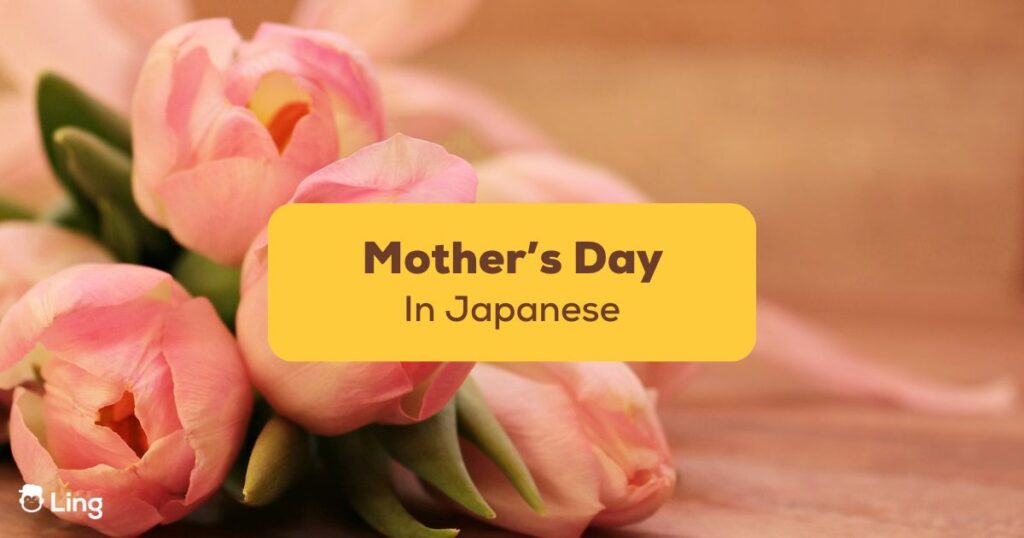Mother’s Day in Japanese culture 母の日(haha no hi) is a day for showering motherly figures with love and gratitude. Flowers, chocolates, greeting cards, and an invitation to a lovely dinner for moms are all staples in celebrating Mother’s Day in Western culture. But have you ever wondered how Japan celebrates this holiday? 母の日, or Mother’s Day in Japanese, is a special family occasion.
This post will cover all things Mother’s Day in Japan, from traditional gifts to when it’s celebrated, and here’s a bonus: if you’re learning Japanese and wondering how to express your sweet feelings with grateful phrases to shower your mother with, keep reading!
Table Of Contents

When Is Mother’s Day Celebrated In Japan?
Every year, on the second Sunday in May, mothers everywhere in Japan are pleasantly surprised by their children with a present and a happy shout of, “itsumo arigatou gozaimasu!” which means “Thank you for always taking care of me.” This phrase is a way of congratulating a mother on her day in Japan.
Did you notice that new phrase? That’s just one of the many different ways to say Mother’s Day in Japanese. The literal form of Mother’s Day in Japanese is 母の日. This is the version you’ll commonly find printed on greeting cards and promotional posters hanging in restaurant windows, beckoning you to come in to treat your mom.
How Do You Say Happy Mother’s Day In Japanese?
In Japanese, to congratulate mothers on their day, you say: 母の日おめでとうございます(haha no hi omedetōgozaimasu), which means Happy Mother’s Day.
Speaking of Mother’s Day, there are many ways to express your feelings towards your dear mommy. If you want to learn some useful phrases for this special occasion, check out the examples below to see how to best show appreciation to your mother.
- 大好きなお母さんへ (daisukina okāsan he~): To my beloved mother~. This is used at the beginning of a message or letter to your mom. After this phrase, you can write the rest of your heartfelt message.
- 本当に感謝しています (hontouni kansha shiteimasu): This phrase means “I am really grateful.”
- 家族を支えてくれてありがとう (kazoku wo sasaete kurete arigatou): This is a nice way to tell your mom, “Thank you for supporting our family!”
Vocabulary Related To Mother’s Day In Japanese: Wake Up And Smell The… Eggs?
Here’s a fun fact for you: Mother’s Day is symbolically associated with breakfast, specifically dishes that feature… an egg!
Japanese egg dishes are the star of the morning. Whether your mother is Japanese or you just want to start the fun tradition of making an eggy breakfast, here are some great ideas for Japanese dishes you can whip up to begin Mother’s Day with a bang! Plus, some vocabulary you need to know.
| English | Japanese | Romanization |
|---|---|---|
| Egg | 卵 | Tamago |
| Chicken and egg bowl | 親子丼 | Oyakodon |
| Savory steamed egg custard | 茶碗蒸し | Chawanmushi |
| Japanese egg omelet | 卵焼き | Tamagoyaki |
| Mother | お母さん | Okaasan |
| Son | 息子 | Musuko |
| Mama | ママ | Mama |
| Daugther | 娘 | Daughter |
Everything Is Coming Up Roses
In Japan, giving flowers is a popular tradition for Mother’s Day. Flowers are the perfect gift when combined with a little card with your feelings of gratitude imprinted in it. There’s nothing like a fresh bouquet that says 大好き (daisuki) or “I love you!”
Roses are considered to be the ultimate flower to give to your mother on Mother’s Day. Roses symbolize unconditional love, devotion, and beauty. On the flip side, carnations are another type of flower that is commonly gifted on this day. These blooms represent purity and are a top choice for children to give to their moms.

Traditional Gifts For Mother’s Day
Japan is a country that is super focused on the gift-giving culture. What better way to wish mothers a happy day than with a thoughtful present? Check out the list below for a list of vocabulary related to the popular gifts associated with Mother’s Day in Japan.
Calligraphy Set (書道セット)
If your haha likes writing, she would certainly appreciate a shodō setto from Japan – a country renowned for its exceptional stationery selection!
Imabari Towels (タオル)
In Japan, gifting taoru symbolizes the “ties” you have with them because towels are made by weaving threads together. This is a very on-the-nose representation that says it all!
Japanese Tea Set (ティーセット)
The traditional tea time wouldn’t be complete without a tīsetto. In Japanese culture, welcoming guests with tea is a sign of a hospitable home, which Japanese people take great care to emphasize. A tea set is the perfect gift for sharing a moment of peace, rest, and a little chat with those you love over a steaming cup of oolong.
Frequently Asked Questions About Mother’s Day In Japan
1. Does Japan Celebrate Mother’s Day And Father’s Day?
Japan celebrates both Mother’s Day and Father’s Day with the same amount of love and excitement! Mothers get the first crack at their own holiday, though a month later (in June), fathers get their turn in the spotlight.
2. What Does “Haha No Hi Omedetou” Mean In English?
Literally, this phrase means “Happy Mother’s Day” but, as we’ve touched base on, this isn’t the way Japanese people wish their loving thoughts to their mothers on this holiday. It’s a bit too formal and stuffy to use, so it’s really just the name of the holiday.
3. Is Girls’ Day Like Mother’s Day?
Of course, both holidays are alike in that they celebrate with femininity in mind, but they each have their own distinct traditions. For example, Girls’ Day involves a lot of treats made with sakura blossoms and sweet red bean paste, while Mother’s Day uses the egg as their food symbol. Older women and young girls alike deservedly have their own holidays meant for appreciation just for them. Girl power!
Closing Words
Now that you’ve learned a bit about Mother’s Day in Japan, It would be interesting to use this opportunity to expand your vocabulary. If you would like to know more than words related to the holiday, You can start to learn Japanese with the Ling app! You can take advantage of a mobile-friendly interface that allows you to go at your own pace with fun mini-games and activities. Don’t think about it anymore—start expanding your Japanese repertoire right away!


































































